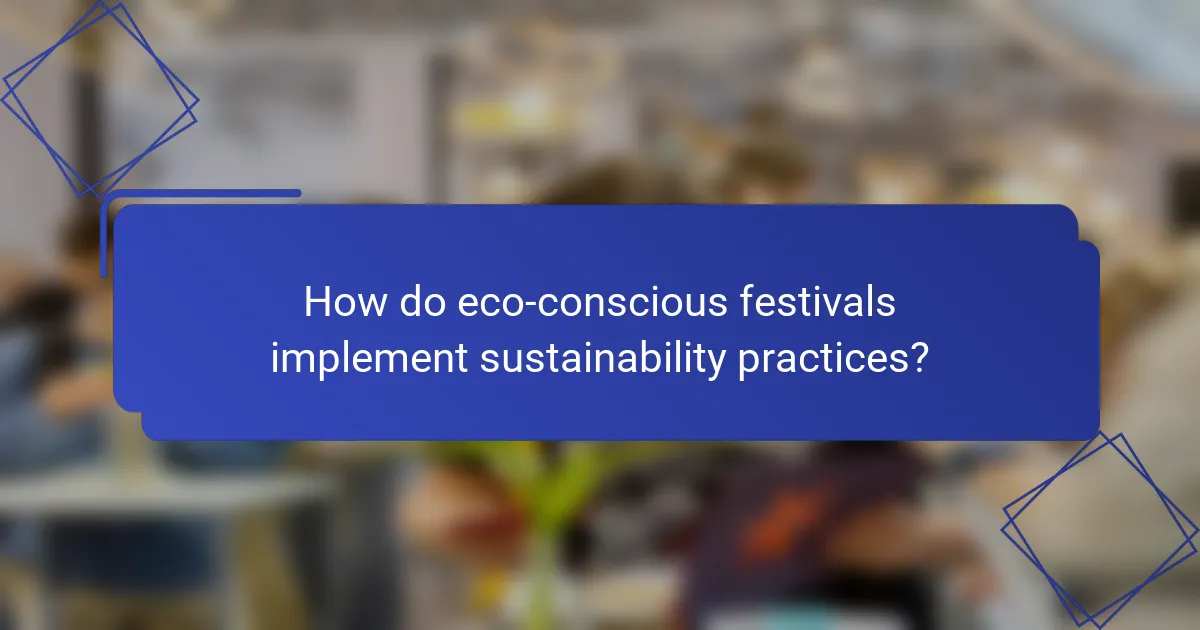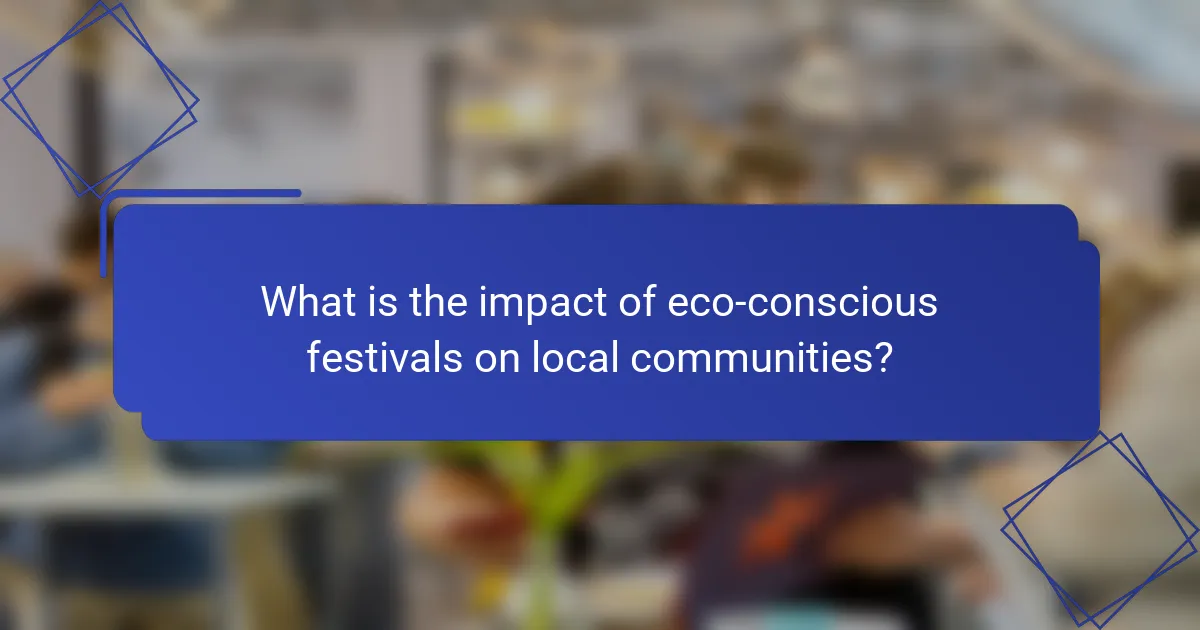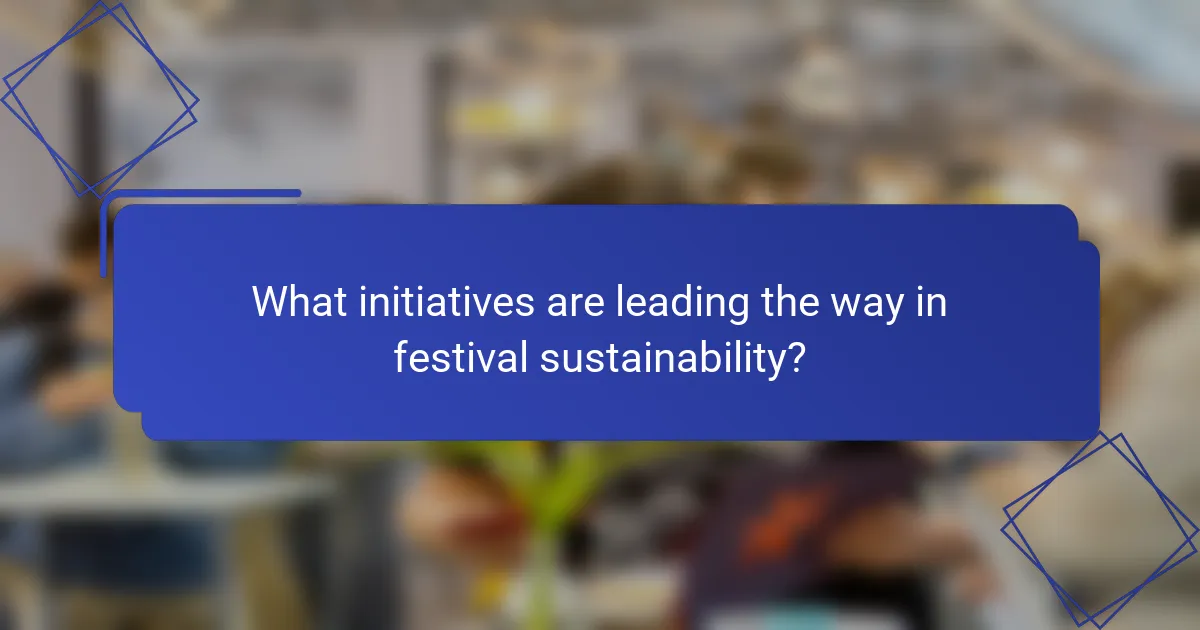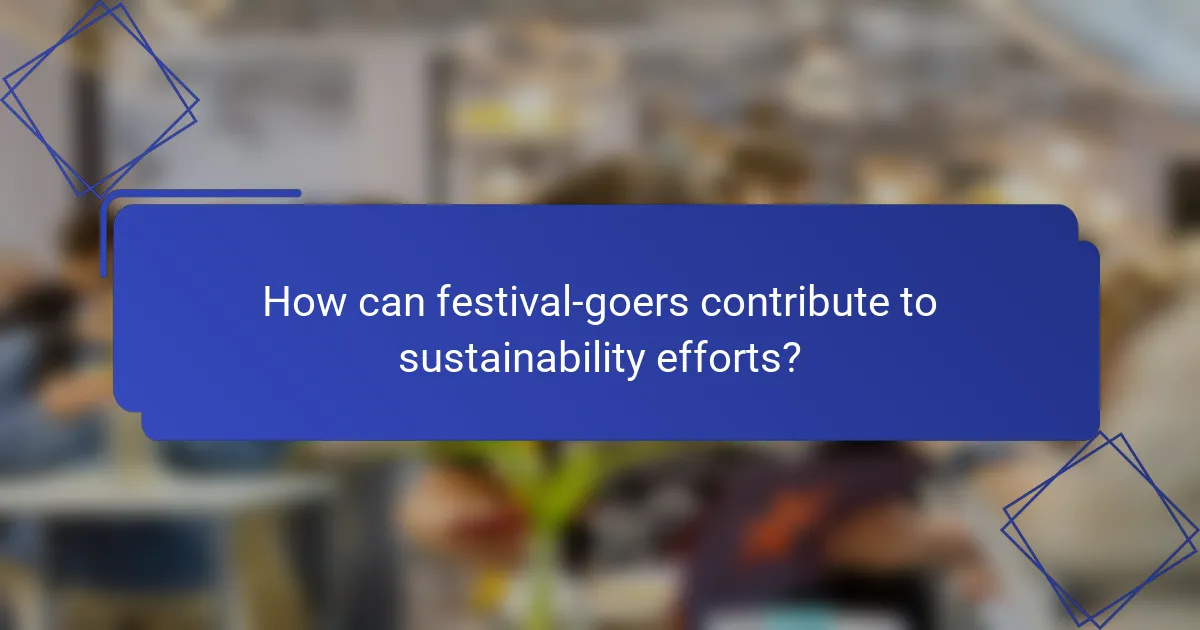Eco-conscious festivals in the United States are designed to entertain while promoting sustainability and environmental responsibility. By implementing practices such as waste reduction, local food sourcing, and renewable energy use, these events not only minimize their ecological footprint but also foster community engagement and awareness of environmental issues.

What are the best eco-conscious festivals in the United States?
The best eco-conscious festivals in the United States prioritize sustainability through various practices and initiatives. These festivals not only entertain but also educate attendees on environmental responsibility and community engagement.
Coachella Valley Music and Arts Festival
Coachella, held in California, has made significant strides in sustainability by implementing a range of eco-friendly practices. The festival encourages carpooling and offers shuttle services to reduce carbon emissions, while also providing recycling and composting stations throughout the venue.
Additionally, Coachella has partnered with local organizations to promote water conservation and minimize waste. Attendees are encouraged to bring reusable water bottles, and the festival has implemented a ban on single-use plastics.
Burning Man
Burning Man, located in Nevada’s Black Rock Desert, operates on principles of radical self-reliance and communal effort, which extend to its environmental impact. The festival emphasizes Leave No Trace, urging participants to remove all waste and leave the desert as they found it.
Burning Man features art installations made from recycled materials and encourages the use of solar power for camps. The community actively engages in discussions about sustainability, making it a hub for eco-conscious innovation.
Shambhala Music Festival
Shambhala, held in British Columbia, Canada, is renowned for its commitment to environmental sustainability. The festival implements a comprehensive waste management system, including composting and recycling, and aims for a zero-waste goal.
Shambhala also promotes the use of renewable energy sources, such as solar and biodiesel, to power stages and facilities. Educational workshops on sustainability and environmental stewardship are integral to the festival experience.
Treefort Music Festival
Treefort, based in Boise, Idaho, focuses on community and sustainability through various initiatives. The festival collaborates with local vendors to provide farm-to-table food options, reducing the carbon footprint associated with transportation.
Treefort encourages attendees to use public transportation and offers bike parking to promote eco-friendly travel. The festival also features a sustainability track, where discussions and workshops on environmental issues take place, fostering a culture of awareness and action.

How do eco-conscious festivals implement sustainability practices?
Eco-conscious festivals implement sustainability practices through a variety of initiatives aimed at reducing their environmental impact. These practices often include waste reduction, local sourcing of food, and the use of renewable energy sources to power the event.
Zero waste initiatives
Zero waste initiatives focus on minimizing waste generated during festivals by promoting recycling, composting, and reusing materials. Organizers often provide clearly labeled bins for waste separation and encourage attendees to bring reusable items such as water bottles and utensils.
To effectively implement zero waste practices, festivals can set specific waste diversion goals, such as aiming for at least 90% of waste to be diverted from landfills. Engaging volunteers to monitor waste stations can also enhance compliance and educate attendees on proper disposal methods.
Local food sourcing
Local food sourcing involves partnering with nearby farms and food producers to provide fresh, seasonal ingredients for festival meals. This practice not only supports local economies but also reduces the carbon footprint associated with transporting food over long distances.
Festivals can feature food vendors that prioritize local sourcing, ensuring that at least 50-70% of their ingredients come from within a certain radius. Additionally, offering a variety of plant-based options can further enhance sustainability by reducing the environmental impact of meat production.
Renewable energy usage
Renewable energy usage at festivals includes utilizing solar, wind, or biofuel sources to power stages, lighting, and other essential services. By transitioning to renewable energy, festivals can significantly reduce greenhouse gas emissions and reliance on fossil fuels.
Organizers can consider installing solar panels or using portable solar generators to meet energy needs. Setting clear targets, such as aiming for 100% renewable energy usage, can motivate festival planners to explore innovative solutions and partnerships with green energy providers.

What is the impact of eco-conscious festivals on local communities?
Eco-conscious festivals significantly benefit local communities by promoting sustainable practices, boosting the economy, and fostering social connections. These events often lead to increased awareness of environmental issues and encourage community participation in sustainability initiatives.
Economic benefits
Eco-conscious festivals can stimulate local economies by attracting visitors who spend money on accommodations, food, and local services. This influx can lead to increased revenue for small businesses, creating jobs and enhancing economic stability in the area.
Additionally, many festivals prioritize local vendors, which helps circulate funds within the community. This practice can result in a multiplier effect, where the economic benefits extend beyond the festival itself, supporting long-term growth.
Community engagement
These festivals often serve as a platform for community engagement, bringing together diverse groups to collaborate on sustainability efforts. Activities such as workshops, volunteer opportunities, and discussions foster a sense of belonging and shared purpose among attendees.
Moreover, eco-conscious festivals can strengthen local networks by connecting residents with environmental organizations, local leaders, and activists. This collaboration can lead to ongoing initiatives that address community-specific environmental challenges.
Environmental awareness
Eco-conscious festivals play a crucial role in raising environmental awareness among attendees. Through educational programs, interactive exhibits, and discussions, these events inform participants about sustainability practices and the importance of protecting natural resources.
By showcasing eco-friendly products and practices, festivals encourage attendees to adopt more sustainable lifestyles. This heightened awareness can lead to lasting behavioral changes, benefiting both the community and the environment in the long run.

What initiatives are leading the way in festival sustainability?
Several initiatives are at the forefront of promoting sustainability in festivals, focusing on reducing environmental impact and enhancing eco-friendly practices. These initiatives provide frameworks and resources for festivals to implement greener operations, from waste management to energy use.
Green Festival Alliance
The Green Festival Alliance is a coalition that encourages festivals to adopt sustainable practices by providing guidelines and resources. Members commit to reducing their carbon footprint through waste reduction, renewable energy use, and sustainable transportation options.
Festivals participating in this alliance often implement measures such as composting, recycling, and sourcing local food and products. This not only minimizes waste but also supports local economies and reduces transportation emissions.
Music Climate Revolution
Music Climate Revolution focuses on the music industry’s role in combating climate change by promoting sustainable practices at events. This initiative encourages artists and organizers to prioritize eco-friendly choices, such as using renewable energy sources and minimizing single-use plastics.
Through campaigns and partnerships, Music Climate Revolution aims to raise awareness among festival-goers about their environmental impact. They provide actionable steps for festivals, including carbon offset programs and sustainable merchandise options, helping to create a more conscious festival culture.

What are the challenges faced by eco-conscious festivals?
Eco-conscious festivals encounter several challenges that can hinder their sustainability efforts. Key issues include securing adequate funding and navigating logistical complexities while maintaining their commitment to environmental responsibility.
Funding and sponsorship
Securing funding and sponsorship is a significant challenge for eco-conscious festivals. Many traditional sponsors may not align with sustainability values, making it difficult to find partners who share the same vision. Festivals often rely on grants, crowdfunding, or partnerships with eco-friendly brands to support their initiatives.
Budget constraints can limit the implementation of sustainable practices, such as waste reduction programs or renewable energy sources. Festivals should consider diversifying their funding sources and actively seek out sponsors that prioritize environmental responsibility.
Logistical complexities
Logistical complexities arise when trying to implement sustainable practices at festivals. Organizers must coordinate waste management, transportation, and energy use while minimizing environmental impact. This often requires detailed planning and collaboration with various stakeholders, including vendors and local authorities.
For instance, setting up recycling and composting stations requires careful placement and clear signage to ensure attendees participate effectively. Festivals should invest in training staff and volunteers on sustainability practices to streamline operations and enhance overall efficiency.

How can festival-goers contribute to sustainability efforts?
Festival-goers can significantly enhance sustainability efforts by making conscious choices regarding their travel, waste management, and consumption during events. Simple actions like using public transport, reducing single-use plastics, and supporting local vendors can collectively lead to a more eco-friendly festival experience.
Travel Choices
Choosing sustainable travel options is crucial for reducing a festival’s carbon footprint. Opt for public transportation, carpooling, or biking instead of driving alone. If traveling from afar, consider taking a train or bus, as these options typically have lower emissions compared to flying.
When planning your trip, look for festivals that offer shuttle services or partnerships with local transport providers to minimize the environmental impact. Many festivals also provide incentives for attendees who use eco-friendly travel methods.
Waste Management
Effective waste management is essential at festivals to minimize landfill contributions. Bring reusable items such as water bottles, utensils, and bags to reduce single-use plastics. Many festivals now have refill stations and recycling programs to encourage responsible waste disposal.
Participate in clean-up initiatives during or after the event. Some festivals offer volunteer opportunities where you can help sort waste and educate others about proper disposal methods, enhancing community engagement in sustainability.
Supporting Local Vendors
Supporting local vendors not only boosts the local economy but also reduces transportation emissions associated with food and merchandise. Look for stalls that prioritize organic, locally sourced ingredients and sustainable practices.
When shopping, choose products with minimal packaging or those made from recycled materials. This not only supports sustainability but also encourages vendors to adopt eco-friendly practices in their operations.



